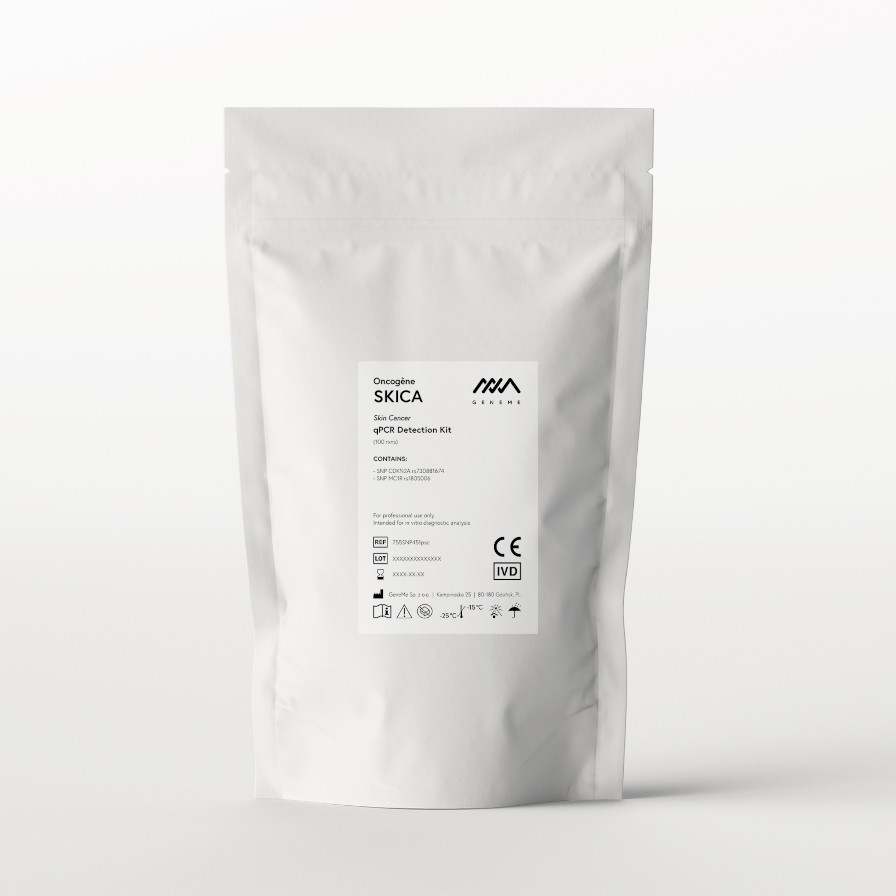SKICA
(Skin Cancer)
qPCR SNP Detection Kit

Description
Analysed genes are responsible for production of proteins that inhibit the development of skin cancer, as well as for the proper pigmentation, which is very important for the protection of the skin. People with abnormalities in the indicated genes belong to the group of increased risk of skin cancer, including melanoma.
REF. NUMBER
755SNP451psc
PREDISPOSITION
Skin Cancer
ANALYSED GENES
CDKN2A, MC1R
IDENTIFIED POLYMORPHISMS
rs730881674, rs1805006
KIT CONTENTS
2 × Nuclease-Free Water
2 × 2xSNP MasterMix
2 × Oligos Set
2 × Positive Control Set
QUANTITY
100 rxns
STORAGE CONDITIONS
-25°C to -15°C
CERTIFICATES
More Information
Did you know...?
Melanoma is a malignant tumor that is caused by the transformation of melanocytes into cancerous cells. There are about 25 new cases of melanoma per 100 000 population in Europe. According to the latest data provided by World Cancer Research Fund International there were more than 150,000 new cases of melanoma of skin in 2020.
What may happen?
Melanoma is caused by skin cells that begin to develop abnormally. Exposure to ultraviolet (UV) light from the sun is thought to cause most melanomas, but there’s evidence to suggest that some may result from sunbed exposure. Radiation has a mutagenic effect on DNA, which causes uncontrolled cell multiplication and at the same time inhibits the excretion of used or damaged cells from the body. Genetic factors are also of great importance and result from mutations occurring in the CDKN2A and MC1R genes. Both mutations contribute to the development of skin cancer.
How the test is performed?
The CDKN2A and MC1R genes are fragments of DNA containing instructions for building proteins that can be involved in melanoma development. Analysis of specific fragments of these genes performed using the real-time PCR method allows to determine the genotype and thus the risk of developing skin cancer. The interpretation of the test result, i.e., information about the risk of developing melanoma, depends on whether and which of the two alleles carries the mutation. Changes in the tested alleles are associated with the malfunction of the encoded proteins and an increased risk of melanoma development.
How will the client benefit?
Interpretation of the obtained results, based on the IFU of the product included in the kit, allows for the preparation of a detailed report containing both the genotype description and recommendations indicating the further diagnostic path. The test we offer is relatively quick, uncomplicated and does not require a lot of lab work.
Why is it worth doing a genetic test?
Professional service and a report with a comprehensive explanation of the result and recommendations will encourage the patient to use other tests. It is worth expanding the laboratory’s offer with genetic tests, as it is an increasingly used form of prevention of many diseases.
What can be done after the test result?
In the case of an unfavorable variant of the gene, it is important to follow the recommendations and consult a doctor. It should be remembered that a normal genotype does not exclude the disease. The great potential of genetic testing makes it possible to predict many diseases and gives a chance to take action to improve health.